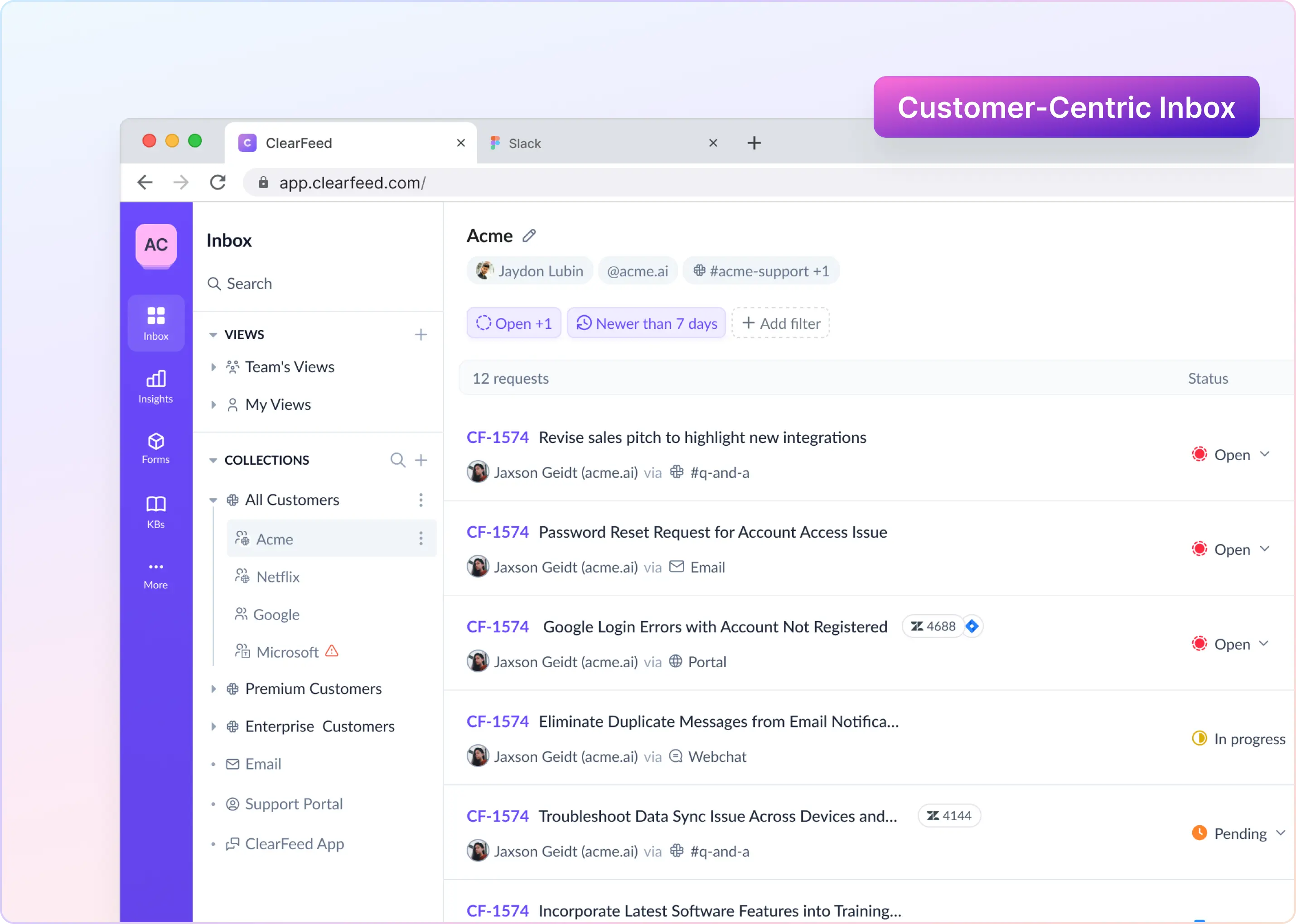Introduction
Customer support for data platforms is a high-stakes game. These platforms power critical workflows, meaning that even a small disruption can snowball into significant downstream effects. The bar is high: users don’t just want problems fixed quickly - they expect proactive, high-touch support where vendors become an extended part of their teams - and help them succeed.
In our recent webinar, Excelling at Customer Support for Data Platforms, we had the privilege of hearing insights from support leaders at PlanetScale, StarTree, and Snowplow. Here’s a breakdown of the challenges, strategies, and solutions they discussed to redefine customer support for data platforms.
TL;DR: Key Insights on Modern Customer Support
- From Tickets to Conversations: Support is now collaborative and real-time, with teams acting as trusted partners.
- Proactive Problem-Solving: Early monitoring, smooth onboarding, and feedback loops prevent issues before they escalate.
- High-Touch Support: Fast, hands-on communication through tools like Slack and Zoom resolves critical issues quickly.
- Integrated Workflows: Combining Slack with ticketing systems ensures speed, structure, and accountability.
- AI as a Tool: AI boosts efficiency for routine tasks but human expertise drives real solutions.
- Resilient Teams: Collaborative cultures, empathy, and recognizing wins keep teams strong and effective.
Let's dive in through some of the key highlights from this discussion.
1. The Shift from Tickets to Conversations
The traditional ticketing model of support is giving way to more fluid, conversational approaches. Today’s customers expect collaborative, real-time solutions that integrate seamlessly into their workflows.
Charlotte Ward, Director of Support at Snowplow, reflected on this shift:
“Support is moving away from tickets. It’s becoming much more conversational and consultative, especially in deeply technical spaces.”
The panelists highlighted Slack as a game-changer for enabling these collaborative engagements with customers. Instead of isolated exchanges, support teams are embedding themselves into customer operations, offering real-time responses and building trust.
Marla Potterveld, Manager of Technical Account Managers at PlanetScale, noted:
“With Slack, it feels like you’re more a part of your customer’s team, rather than someone they have to bother for help.”
Key Takeaway: Modern customer support thrives when teams move beyond tickets to become trusted partners in their customers’ workflows.
2. Proactive Support: Solving Problems Before They Arise
Proactive support ensures smoother customer experiences and builds long-term trust. Instead of waiting for problems to escalate, teams are implementing strategies to anticipate and prevent them.
- Real-Time Monitoring and Alerts
At StarTree, implementing robust monitoring systems to detect anomalies early is crucial. Minesh Patel, Enterprise Architect at StarTree, described how real-time monitoring helps them identify issues early:
"We use predictive analytics to identify patterns that indicate scaling issues before they affect customers."
- Streamline Onboarding Processes
Smooth onboarding is critical for building customer confidence and setting the tone for a successful partnership. At PlanetScale, Marla shared how her team prioritizes tailored workflows to guide customers through complex migrations and implementations without any downtime.
“Getting customers into production with no downtime migrations ensures stickiness and long-term success.”
By ensuring customers transition seamlessly to the platform, PlanetScale positions them for success while reducing friction in the early stages of adoption.
- Leverage Feedback Loops
At Snowplow, support insights directly influence product improvements. Charlotte Ward explained how her team continuously analyzes support tickets to uncover recurring issues. These findings are then shared with the product team to address root causes and improve the overall customer experience.
“We take metrics from support interactions and feed them back into product development to improve customer journeys.”
This approach ensures that the support team not only resolves current issues but also proactively prevents future ones by shaping a more intuitive product.
- Educate and Empower Customers
Educating customers is another powerful tool. Comprehensive documentation, self-serve resources and targeted training help customers handle routine challenges on their own, freeing up support teams for more complex tasks.
“Proactively educating customers not only reduces support tickets but also empowers them to fully leverage the platform’s capabilities.”
Key Takeaway: Proactive support, through monitoring, onboarding, feedback loops, and education, keeps customers ahead of problems while reducing escalations.
3. High-Touch Support for Quick Issue Resolution
When critical issues arise, speed and direct communication can make all the difference. For data platforms, this often means combining high-touch support with fast collaboration between teams.
At StarTree, Slack is integral to fostering this collaboration. Minesh Patel described how Slack enables real-time collaboration with customers for resolving critical challenges:
“Our SRE (Site Reliability Engineering) team often coordinates directly with customers for scaling issues, with Slack enabling real-time collaboration across teams.”
On the other hand, for PlanetScale, collaboration often extends to providing hands-on, real-time solutions. Marla Potterveld shared how they handle critical incidents:
“If there’s a P1 issue, we’ll jump on a Zoom call immediately and work through the problem in real time. Slack makes it easy to pull in the right people quickly.”
Key Takeaway: High-touch, direct communication - through Slack, Zoom, and real-time collaboration - helps resolve critical issues faster while strengthening trust with customers.
4. Integrating Slack with Enterprise Ticketing Tools
While conversational platforms like Slack provide flexibility, structured ticketing systems are essential for tracking, accountability, and workflow management. Integrating the two ensures no issue falls through the cracks.
Charlotte Ward from Snowplow explained how they balance both systems:
“Combining conversational platforms with ticketing systems gives us both speed and accountability in managing requests.”
These integrations allow support teams to work where customers are most comfortable (like Slack) while keeping a systematic record of all requests. Tools like ClearFeed play a key role by bridging Slack conversations with ticketing systems like Zendesk.
Minesh Patel noted how these integrations solved a common pain point:
“Before, there was always this tension - support teams tracked everything in Zendesk, but customers preferred Slack. Integrations like ClearFeed bridge that gap, making life easier for everyone.”
Key Takeaway: Integrating conversational tools with ticketing systems ensures real-time, high-touch support remains organized and actionable.
5. Building and Scaling High-Performing Support Teams
Building a strong support team starts with the right people, the right culture, and the trust to handle challenges together. The panelists shared their views on how they build resilient support teams.
- Teamwork as a Safety Net
At PlanetScale, the foundation of a resilient support team is trust and collaboration. Marla Potterveld highlighted how her team members step in for each other during tough shifts:
“If I’ve had a rough on-call shift, I know someone on my team will step in and cover for me. That trust makes a huge difference.”
Having a culture where team members support one another helps prevent burnout and ensures everyone feels valued.
- Hiring for Empathy and Adaptability
For Snowplow, hiring the right people is just as important as creating the right processes. Charlotte Ward explained that her team looks for more than just technical expertise:
“We hire people who can stay calm under pressure, think clearly, and work well with others. It’s not just about technical skills - it’s about mindset.”
Support work is inherently stressful, but having the right people on board makes it easier to handle those challenges.
- Celebrating Wins
Small victories can have a big impact on morale. Whether it’s solving a tricky technical issue or receiving positive feedback from a customer, celebrating successes helps keep the team motivated and engaged. Minesh Patel emphasized the importance of creating a positive team culture:
“A collaborative, supportive culture ensures that stress is manageable and people feel valued. That’s how you keep a team strong.”
Key Takeaway: Resilient support teams are built through collaboration, empathy, and a culture where people feel valued and supported.
Wrapping Up
The insights from the panelists emphasised how modern customer support goes beyond problem-solving to become a strategic advantage. By adopting conversational models, leveraging the right tools, and fostering collaborative, resilient teams, organizations can drive greater customer success.
PlanetScale, StarTree, and Snowplow trust ClearFeed to scale their Slack-based support operations, streamline customer engagement, and improve onboarding workflows.
If you’re looking to transform your support experience and elevate your support team’s impact, book a free demo with us and get a personalized product walkthrough from our support experts.
















